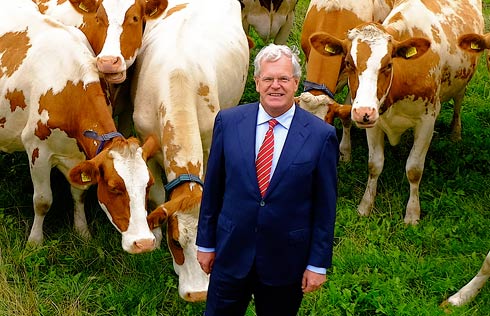More doors for global e-commerce
Whether it's a small company or young entrepreneurs with little business experience, more people will be able to conduct trade across the world in a way they could only have dreamed about. That's if China's e-commerce giant Alibaba Group Holding Ltd has its way.
The company, based in Hangzhou, East China's Zhejiang province, has pledged to knock down trade barriers and allow small- and medium-sized enterprises everywhere to participate more easily in global commerce via the establishment of the Electronic World Trade Platform, also known as the eWTP, a concept envisioned by Alibaba's executive chairman Jack Ma early last year.
"With this flow of information ... all manufacturers and brands, regardless of size and as long as their products are good and they provide a good service, will have an equal opportunity to enter the consumer market," Daniel Zhang, Alibaba's CEO, said.
Speaking during a cross-border e-commerce event held at the company's headquarters in December, Zhang said that the internet played the most important role in the establishment of the eWTP, which was mentioned in the G20 Leaders' communique following their meeting in Hangzhou in September.
Leveraging big data to forecast consumption trends and improve the operating efficiency of the global supply chain will be one of the top priorities of Alibaba's globalization strategy, he added.
According to Zhang, the company will soon establish a pilot project in Hangzhou to test the eWTP with real businesses and hopefully take the project to a wider number of outlets in China so it will eventually be adopted across the world.
Many foreign brands have already used Alibaba's platforms to make forays into China. Last year, the company's Tmall Global, which enables international brands to sell online directly to Chinese consumers, saw the number of categories of imported products climb by nearly 50 percent to 3,700. Now, more than 14,500 international brands from 63 countries and regions feature on Tmall Global.
The ultimate goal of the eWTP is to enable people to conduct trade anywhere in the world, not just China. However, that seems a long shot because it will require low import duties, rapid customs clearances and better access to logistics.
To achieve that aim, the platform will require strong support from governments around the world, and some national leaders have already come on board. For example, in December, the Thai Ministry of Commerce signed a comprehensive partnership deal with Alibaba in an attempt to enable the country's SMEs to conduct e-commerce business in and outside Thailand.
Luigi Gambardella, president of ChinaEU, a business-led International Association in Brussels, said he expects the eWTP initiative to be endorsed by a larger number of international leaders.
"The solution to today's economic slowdown is to increase the inclusion of global trade and improve the involvement of SMEs," he said.
"The eWTP will provide SMEs with a transparent and open platform to sell their goods and services globally, thus facilitating their inclusion in cross-border e-trade."
However, he stressed that the final goal should be e-commerce without borders that will give consumers the freedom to shop online without limitations.

















